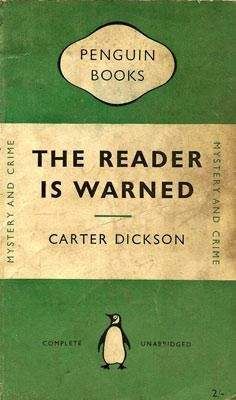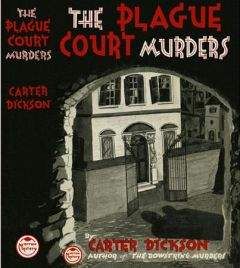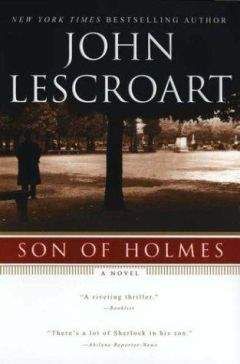John Carr - The Reader Is Warned

Помощь проекту
The Reader Is Warned читать книгу онлайн
Sanders said: 'Look here, sir, this has got to be a showdown. The time for hocus-pocus is past. You tell me what I'm to do, and I do it; you tell me how deeply I'm involved, and what to be careful of, and how I must help you; but it's only fair to give me a shot at what's going on.'
'Uh-huh. Well? What is it?’
'Do you say now that Pennik didn't do the murders?'
'He didn't do anything,' returned the heavy voice, dully and rather wearily. 'He didn't do any murders; he don't even know a thing about any murders. He's absolutely innocent of crime or complicity in crime of any kind at all.'
Below them on the tall balcony, wind frothed in the leaves of the garden.
'There,' pursued the heavy, eerie voice. 'There you are. That's the hobgoblin that's been frettin' you, and frettin' the world, for nearly a week. But come along with me. I’ll show you a real hobgoblin, if you like.'
He moved along towards the iron stairway towards the balcony of the floor above. For all his breadth and lumbering movement he made little noise. Sanders followed him.
'But this is the Constables' flat! This one. Here, on this floor. This is where they lived. Why are we going upstairs?'
That whole unnatural colloquy, taking place in explosive whispers, was beginning to wear on the nerves of everyone present. The steep stairway creaked, H. M. went ahead, and the others followed. Up at the top floor there was a gleam of moonlight through iron ribs and slats. Almost at the top of the stairs, H. M. hesitated and turned round. The moonlight shone on his spectacles, and on the nap of the ancient top-hat that was pushed to the back of his head. His thick arms were outstretched as though to bar the top of the stairs. Just as he turned round, they all heard, thinly but shrilly ringing, the front doorbell of the top floor flat.
'I expect that's the real murderer ringin' at the bell now,' muttered H. M. 'Listen to me. We're goin' to look in through some windows that have been left for us. If anybody speaks while we're up on this balcony, I'll murder him. I just want to tell you that up here is the flat of the person towards whom the whole scheme of the dirty work has been directed almost from the beginning; and that person is supposed to die to-night. Come on.'
His coat disappeared. Above them there was no hood to the balcony. Moonlight silvered the tiles of the roof, and the long windows that stretched to the floor. These windows opened out like doors; two of them stood several inches open how. Inside were heavy pink draperies probably half an inch thick; and these also had been left partly open. There was a slight mist or unreality about the scene, since, in addition to the padded draperies, curtains of very fine-spun gold mesh had been drawn across the windows. No breath of air stirred them. As though through a film of gauze, the watchers looked into the dimly lighted box beyond.
It was a woman's bedroom or boudoir after the French fashion of the middle eighteenth century. The wall-panels were of silk, alternating in mirrors with gilt medallion-heads. The bed at their left, a sort of indoor tent, was draped and billowing from a gilded circle of wood in the ceiling; and from this ceiling the chandelier hung in weights of crystal. But there were no lights except two electric wall-candles burning. Someone whom they could not see, presumably the owner of the flat, sat in a high wing chair with its back to the windows.
They had already heard the murderer ringing at the door- ' bell. A voice from the wing chair called back a request to come in. There was a noise of footsteps coming through other rooms in the flat.
Dr Sanders, who felt his heart bump as though with a physical fall, was gripped by H. M. and thrust towards the gap in two of the curtains. Directly across from him there was a door. That door opened and the visitor came in.
It was P.C. Riddle who disobeyed H. M.'s orders.
He spoke in a hacking, shattering whisper almost against Sanders's ear.
'But I know who that is, sir,' he seemed half to shout. 'I've often seen her here at her stepmother's flat. That's Miss Hilary Keen.'
chapter xix
The mist of unreality about that scene behind the gold gauze, the two electric candles throwing their light dimly on silk wall-panels, the hush given to footsteps and even voices by very thick carpeting, all these things kept the brains of the watchers dulled like an opiate.
In the midst of this finery, Hilary looked deprecating and rather apologetic.
True enough, there was a somewhat breathless air about her, and a faint colour in her cheeks; but this might have come from walking too fast up the stairs. For she carried under one arm a sizeable squarish parcel wrapped in brown paper. She wore a tailored suit of dark green tweed, and a soft hat which shaded her eyes. Despite her deprecating air, her smile was the straightforward smile that all the watchers had seen.
A crow of pleasure or welcome issued from the chair where her hostess, and stepmother, was sitting. 'Hilary, my dear! How nice of you to come!' And her hostess bounced up.
By moving his head sideways, Sanders could now see Mrs Joseph Keen reflected in one of the long mirrors across the room. She was a small, plumpish, extremely good-looking blonde, with long ringlets which fell past her shoulders, large lips, and narrow twinkling eyes. She could not have been much older than Hilary herself; and beside Hilary she looked tiny. She was wearing a heavy lace neglige which went with her air of silk sleekness. Running to Hilary, she kissed her smackingly on both cheeks.
'How are you, Cynthia dear?' said Hilary, allowing herself to be kissed.
'I knew you would come,' said Cynthia triumphantly 'I promised there shouldn't be anybody else here, and there isn't! Hilary, you wretch, I've been running after you for days and days and days -'
'But you only got back from the Riviera on Sunday,' protested Hilary. She paused, and added in a curious voice: 'How was the Riviera ?'
'Heavenly! Absolutely heavenly!'
'I imagine it was.'
'Oh, it was. I met the nicest - but never mind that. You know what I want to hear. All about P-e-n-n-i-k. Hilary, you've become positively famous; all these terrible things in the papers; I can't think what's come over us. And you there in the middle of it all, all the thrilling things and everything. And that's not all. Pennik! They say he'd do anything for you; they say he adores you; positively dotes on you.'
'I suppose he does, rather.'
'Stella Erskine saw you both at Borononi's last night. Stella said she saw him lean over and kiss your hand in public. Well, I mean. Aren't you thrilled? I should be. Like being taken out by Hitler or Mussolini; only more so, if you know what I mean. Hilary, people positively run after me when they know I'm related to you. But you will tell me first, won't you? You will tell me all about it?'
'You shall hear all about it, Cynthia dear. I promise you that.'
Cynthia wriggled with pleasure.
'That's my Hilary. Now come over here and sit down, do. I can't wait to hear about it. Is he nice? Has he - you know what I mean, dear? Yet, I mean? They say it's a real grande passion, like those French kings who tear about in the stories and whoop it up so.' Her forehead clouded, though not seriously. She half laughed. 'Stella says I'd better be careful. She says she heard that Pennik said I wasn't fit to live, because I took your father's money from you or something like that. How absurd! Isn't it, dear? But don't stand there like that, please. Take off your things. And what on earth is that you've got under your arm ?'
'A little present for you.'
Cynthia's eyes opened, and she flushed with pleasure. 'For me? Oh, Hilary, how nice of you. And that reminds me. I brought you something from the Riviera too; it isn't much, but it was the best watch they had in the shop, and it's got diamond movements or something, whatever that means. There now, I've gone and told you what it was, but never mind. What's in yours? What is it? Let me open it.'
'You'll know in just a minute, Cynthia dear,' said Hilary.
Eluding the other's hands, she put down the parcel on the ledge of the white marble mantelpiece. Smiling, she took off her hat and shook back her rich brown hair.
'Hilary! Is anything wrong? You're trembling!'
'Nothing at all, Cynthia dear. - May I use your bathroom for a moment?'
'Of course,' said Cynthia, smiling at her rather archly. Though Hilary kept her own mechanical smile in the dimness of the room, she gave her companion back a long, curious look; and Sanders's heart turned cold inside him. Then, picking up her handbag with a swift movement, Hilary strode with the same swift movements across to the bathroom. She went in and closed the door.
Sanders could hear somebody's watch ticking. He did not think; he did not dare think. Once he had taken a step forward, as though to interrupt, but H.M.'s hand fell with a crushing grip on his shoulder.
Cynthia Keen hummed a little to herself; looked at herself in a mirror with her head on one side; turned round slowly, examining herself; laughed a little with excitement; lighted a cigarette from a box on a little table beside the wing chair; and put the cigarette out again immediately. She was evidently so avid to hear the details that she could not stand still. Then the bathroom door opened; and the atmosphere of that over-decorated room changed as palpably as though a cold current of air had been turned into it.
Yet it would be difficult to say just how or why the atmosphere had changed. The dim electric candles were burning near Hilary's face, one on either side of the bathroom door just behind her. They threw slanting shadows. They showed that Hilary's colour was perhaps a little higher, and that she was breathing perhaps a little faster; nothing more. She kept her pleasant, poised, rather heavy look. Keeping both hands behind her, she used one of them to push the door shut.
Hilary took a step forward. Cynthia half laughed.
'Darling', what on earth is the matter? I never saw such an absolute juggins! Is anything wrong?'
Hilary took another step forward, her hands still behind her back.
'Hilary!'
'No, really,' said Hilary, breaking the tension by speaking in her quiet, pleasant voice. 'There's nothing wrong with me, Cynthia dear. Only -'
She had nearly reached the chair. By this time, even outside the window they could smell faintly the new odour in that overheated room: the odour of chloroform. Cynthia must have smelled it, too, or must have caught another sort of atmosphere which surrounded Hilary; for she turned in such a way that her face was repeated in several mirrors, and all the faces were white. Nor did Hilary raise her voice in speaking: it was only the contrast between the quiet tones and the meaning of what she said.
'Only I'm going to kill you as I killed Mina Constable,' said Hilary - and flung herself on the other woman.
She spoke almost too soon.
Sanders could have told her that to administer chloroform to a fighting patient is not so easy as the layman supposes. The face-cloth, which she had saturated with it, almost slipped out of her hand; and Cynthia Keen was on the edge of being able to scream, for they saw her teeth before her head was buried in the crook of Hilary's arm. Both were carried over out of sight into the deep chair. Only the flapping, panting noises beat against the back of the chair and shook it partly round. It was a full minute before Cynthia's legs, the feet in white satin mules, ceased to kick and presently fell.
Hilary got up and backed away.
She was bent forward almost double so that the sides of her hair had fallen over her face, and she was breathing hard: Her blue eyes were blank, yet at the same time intensely watchful; they roamed into corners, they were poised as though every nerve were listening, they probed even the silence.
Then she examined herself. One of her stockings had laddered. She automatically put her finger to her lips, moistened it, and ran it along the edge of the stocking before she straightened up. Slowing down her panting breaths, pushing back her hair, she went to look at her now pale face in the mirror over the mantelpiece. Yet she never 'left off that strung-up watchfulness, turning round and round as she moved, round and round, as though wondering if something would surprise her in a corner. The silence felt too heavy; there was not even a clock.
As though remembering, she ran and turned the key in the lock of the door. Then, hastily, she broke the string of the brown-paper parcel on the mantelpiece. It seemed to contain a large box of stiff cardboard, which in turn contained several articles. First she took out several lengths of very heavy but soft-looking black plaited cord, evidently the cord of a dressing-gown cut into pieces. Next she took a pair of rubber gloves, and rolled them expertly on her hands.
Half carrying, half dragging the unconscious woman, her face suddenly snowing red and ugly with a grimace over Cynthia's lace-covered shoulder, Hilary supported her to the bed. She rolled her on to the bed, into the darkness under that muffling fall of brocaded canopy-curtains.
For the first time Hilary spoke aloud.
'I shall have to undress you, Cynthia dear,' she said. 'People have to be undressed before they can die in the way the other two died. After you're undressed, we will just tie you up with these, which are soft and won't leave bruises on you. Then' - she raced back to the mantelpiece, returning with a handkerchief and several strips of sticking-plaster -'we'll put this in your mouth and fasten it with the plaster to finish the gag. I want you to be fully awake when you die.'
Hilary sprang up and round again, her eyes searching,
The fine lightness and grace of her movements, like that of a dancer, was in contrast to the expression of her eyes. Those eyes moved towards the windows, hesitated and moved back. On the bed the other woman uttered a faint moan.
'Yes, you will be coming round in a moment,' said Hilary quickly. 'That must be seen to.'
Two minutes later she pulled up the bed coverlet over the stirring and muttering woman, who now could not move her arms or legs.
'Cynthia. Can you hear me?
'If I dared. I wonder if I dare take that gag out. If I dared.
'Cynthia!'
Inside the canopy showed only a blob of darkness, which Hilary's arm shook. Then Hilary herself seemed to wake up. Across the room there was a fat, squat-legged cabinet of gilt and lacquer-work, its front painted with a pastoral scene of Watteau shepherds and shepherdesses. It held, ingeniously concealed, a radio. Hilary clicked the switch, but no answering light showed against the glass inside. She hurriedly examined the base-plug, which was connected; again she clicked the dead switch back and forth.
'Cynthia, why won't this radio work ?'
There was no reply.
Hilary went over to the bed and spoke in a tone of quiet reasonableness. 'You see, I have got to hear Pennik speaking, poor lamb. He is going to announce your death, and I want to know when to kill you. Teleforce isn't much good unless I give it a little help unknown to him. As the dear chief inspector once truly said, Pennik couldn't kill an ant with a fly-swatter - though he quite sincerely thinks he can; and it's gone to his head.'























